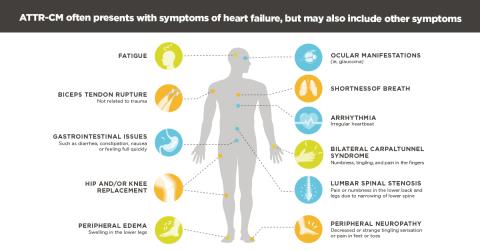
Sponsored content provided by Pfizer
Heart disease is a leading cause of death for all Americans, but certain minority groups face a greater risk than others. In fact, according to one study, African Americans were 45 percent more likely to die as a result of heart failure-related hospitalization compared to Caucasian populations in the United States. Because of this and the disproportionate rates of heart failure, heart attacks, and other serious heart conditions in the African-American community, it’s important to fully explore the underlying cause of these conditions with the help of a cardiologist.
One rare, but very serious form of heart disease is ATTR-CM, or transthyretin amyloid cardiomyopathy. ATTR-CM is a life-threatening, underdiagnosed disease associated with heart failure, but many people have never heard of it or don’t know what it is.
Who is Affected By ATTR-CM?
There are two sub-types of ATTR-CM, wild-type and hereditary. Wild-type ATTR-CM is thought to be the most common form of ATTR-CM, is mostly associated with men over the age of 60, and is not caused by a mutation in a person’s genes. Most wild-type patients are white.
Hereditary ATTR-CM, affecting both men and women, is inherited from a relative and is due to genetics. In the United States, the most common genetic mutation associated with hereditary ATTR-CM is found almost exclusively in people of African or Afro-Caribbean descent. Symptom onset can occur in people as early as their 50s or 60s; however, people who have the mutation may never develop symptoms of the disease.
What Are the Symptoms of ATTR-CM?
Since many patients and even some doctors are unfamiliar with ATTR-CM, the condition is highly underdiagnosed. Many people with ATTR-CM present with symptoms similar to those of more common causes of heart failure ─ such as fatigue, shortness of breath and swelling in the lower legs ─ or have symptoms that are not commonly perceived to be linked to a heart condition, like carpal tunnel syndrome (numbness, tingling, or pain in the fingers), bicep tendon rupture, gastrointestinal issues (constipation, diarrhea and nausea) and lumbar spinal stenosis (a narrowing of the open spaces in the lower spine). These factors can lead to delays in diagnosis or misdiagnosis.

To learn more about ATTR-CM, including the misunderstood symptoms that often delay diagnosis, visit YourHeartsMessage.com.
About the Sponsor
Pfizer is one of the world’s leading biopharmaceutical companies working to develop effective therapies for patients affected by rare diseases, including transthyretin amyloid cardiomyopathy (ATTR-CM). Pfizer is committed to increasing awareness and furthering research for those with ATTR-CM. To learn more visit www.pfizer.com.
PP-R1D-USA-0727
Additional Resources

Visit the HFSA Patient Hub to explore tools and resources to help patients stay healthy while living with heart failure.
View Heart Failure Awareness 365 activities to stay up-to-date on tips for healthy living for people living with heart failure.
